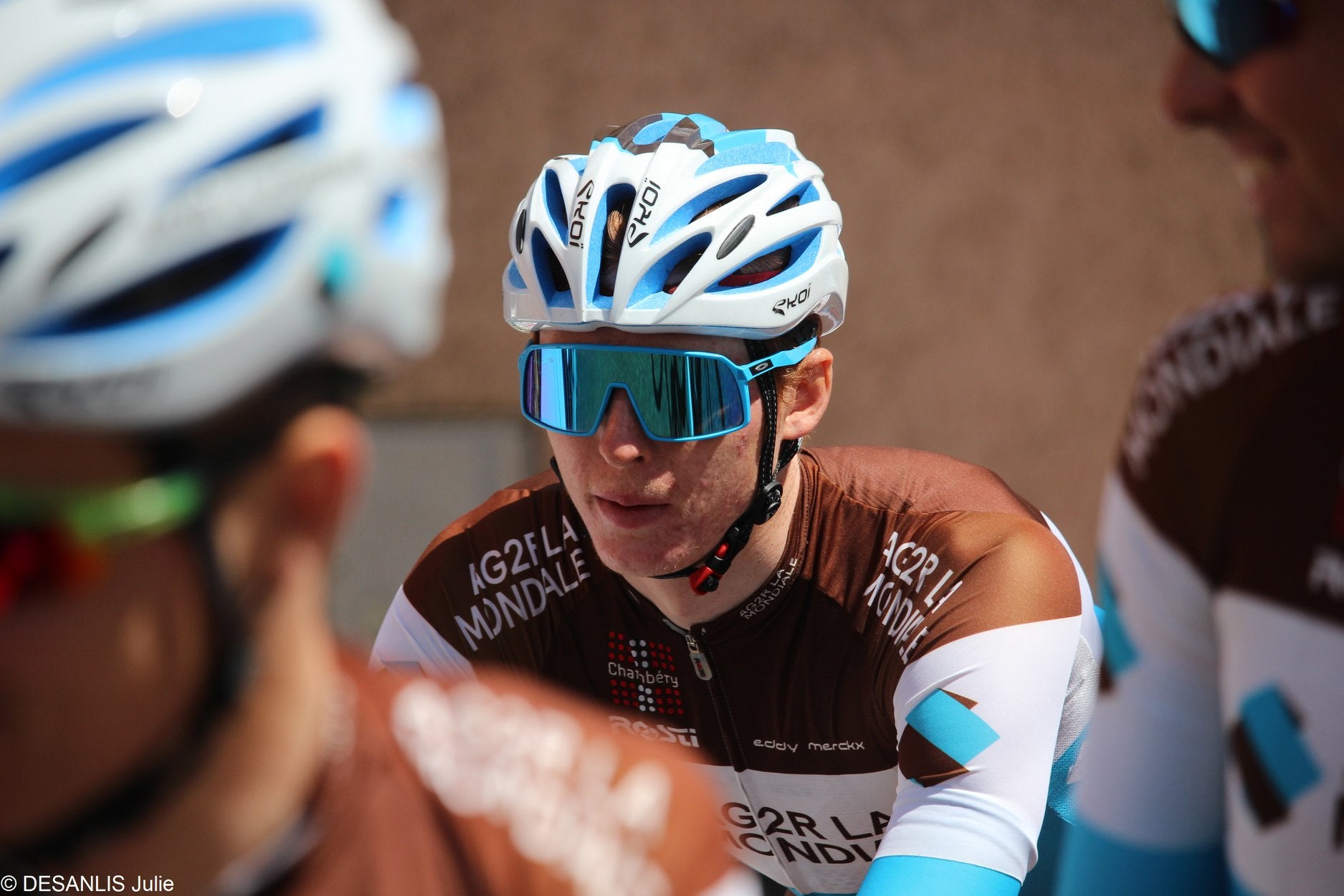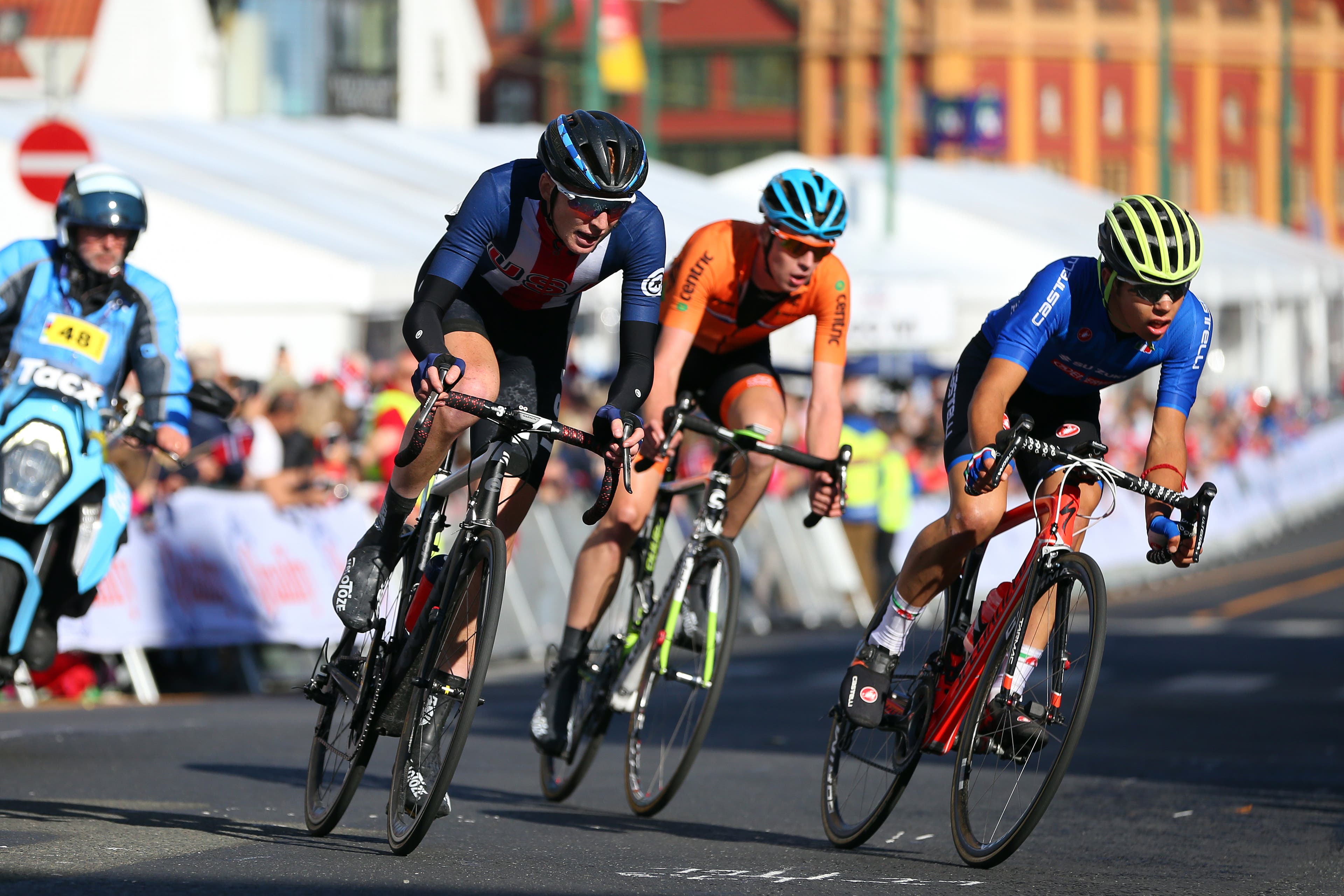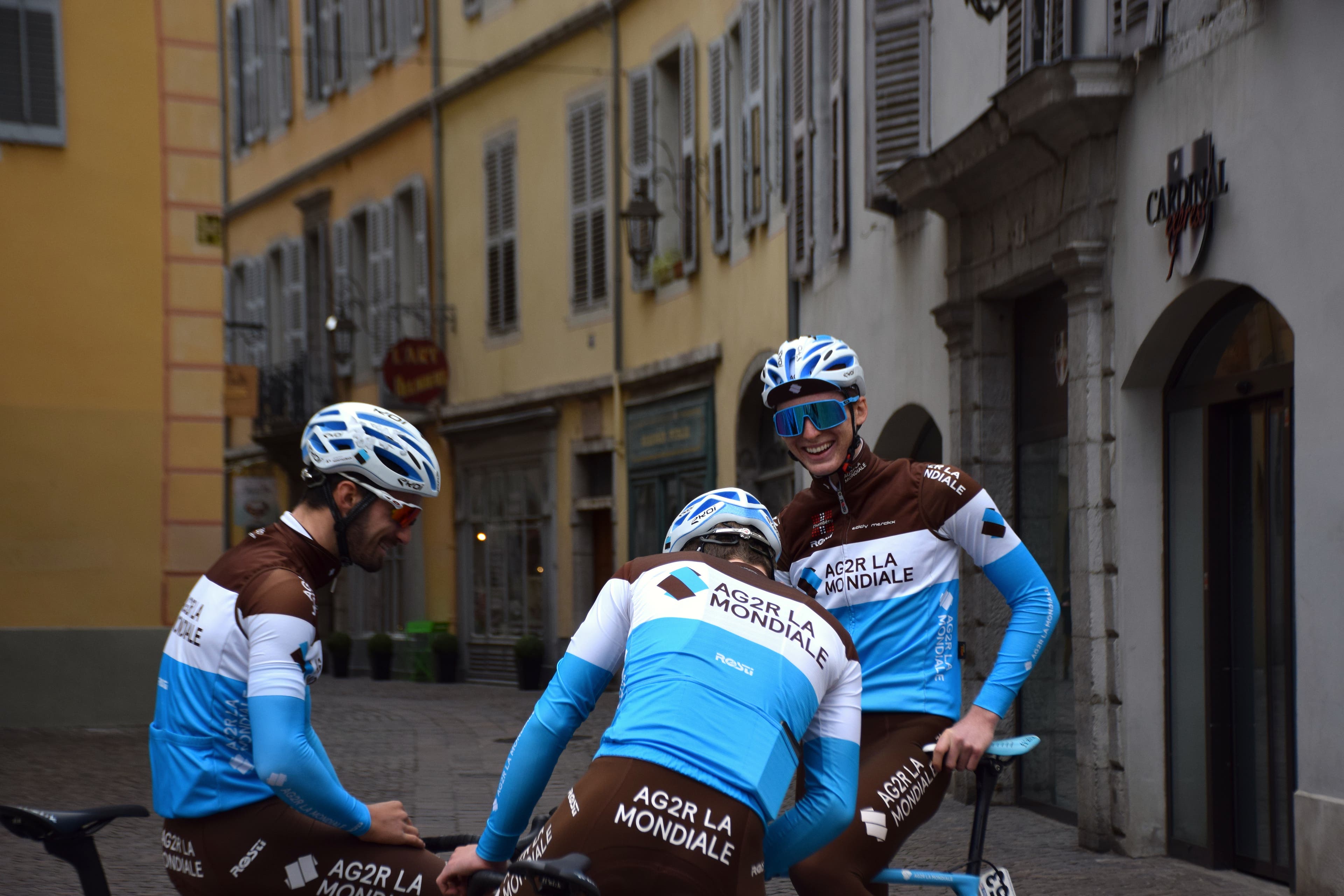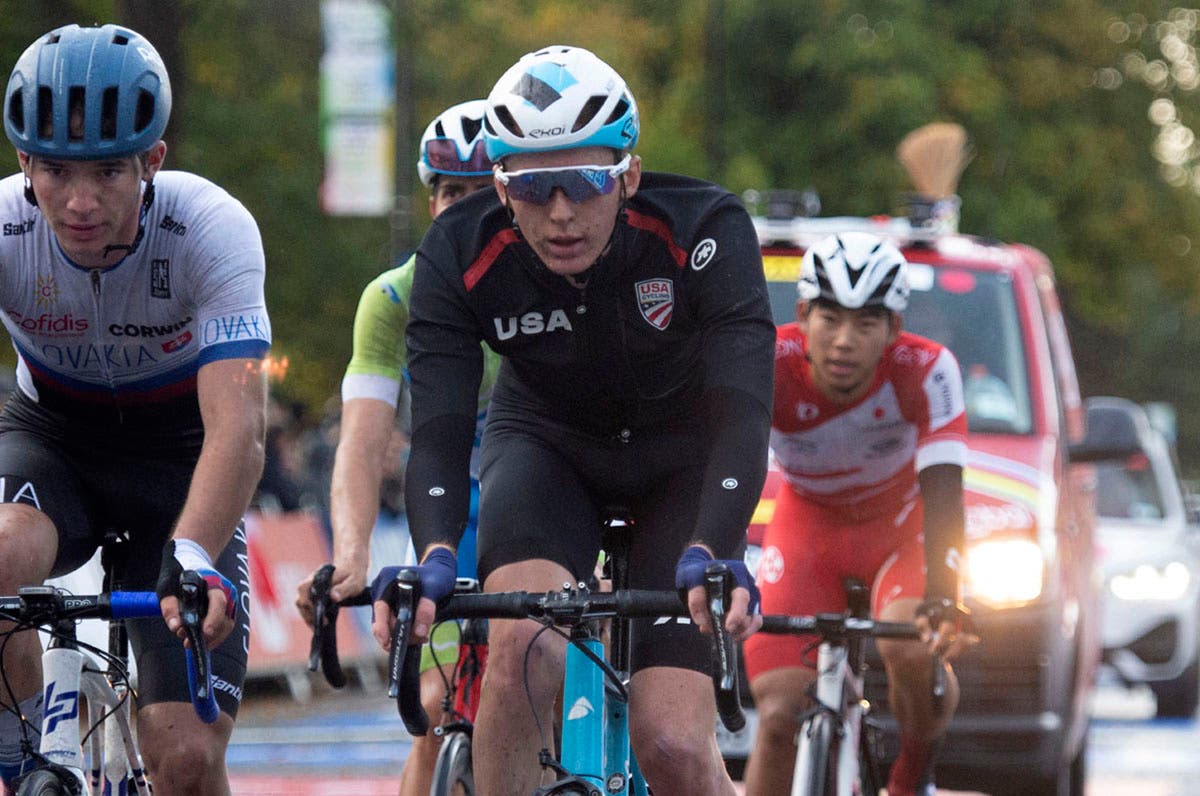Matteo Jorgenson's unorthodox pathway to the WorldTour

Photo: Julie Desanlis
My name is Matteo Jorgenson and I am an 18-year-old American, racing my final year as a junior with Hot Tubes Cycling and the USA Junior National Program. I am in Europe preparing for the World Championships and I am very interested in riding for you for 2018.
Being a part of the USA National team for the past four years, I have had the opportunity to live and race in Europe as both a U17 and Junior in the Junior Nations cup. The racing in Europe is what develops a rider to be great, and this is what has attracted me to your program.
In the final months of the 2017, Matteo Jorgenson, then a 18-year-old rising talent in the U.S. junior racing scene, typed the above email introduction again and again as he reached out to European pro teams, seeking a roster spot for the following season.
Jorgenson wrote versions of this email in different languages, asking bilingual teammates to proofread the notes. He personalized each email depending on the team and its focus, be it French stage races or a Vuelta a España berth. Each note was destined for one of the dozens of team email addresses that Jorgenson had compiled by speaking with other teams and riders at races, or through Google searches.
“Every day I’d try to write three emails after my training rides because I was trying really hard to market myself,” Jorgenson told VeloNews. “What does this team want from its rider? What was their racing calendar right? I was spending an hour on each email.”
Jorgensen, now 20, laughs as he recalls this nervous period in his young cycling career. Two years later, he has become the latest American to enter the WorldTour ranks, inking a deal with Spain’s Movistar team for 2020. The last time the Spanish squad had an American on its roster was 1995, when it was called Banesto, and Andy Hampsten briefly wore its colors.
While Jorgenson earned his place in the WorldTour with impressive results, his journey was undoubtedly helped along by professional skills that any young job seeker might want to cultivate. In his quest to earn a place in the European peloton, Jorgenson learned to cultivate professional relationships, and to sell himself to directors who knew very little about his skills. He dedicated himself to learning foreign languages, and to assimilating to the different cultures.
“I tried to build any sort of connection or relationship I could that could get me onto a team,” Jorgenson said. “Reaching out to these teams and telling them to watch me and getting them to know my name was incredibly helpful in that regard.”
Destined for Europe

The U.S. Junior National team has, for years, provided a taste of European racing for talented American youngsters. By the time he was 15, Jorgenson knew he wanted to pursue a livelihood of racing bicycles overseas. American races rewarded fitness, while races in Belgium and France required intelligence, patience, and above all, experience.
“There was this stark contrast between the races in Europe versus Valley of the Sun or San Dimas—it felt like a completely different sport,” Jorgenson said. “I felt like every race I did in Europe, I progressed the same as doing 10 races in the U.S.”
Of course, making a career in Europe is easier said than done. Americans have always faced an uphill battle in securing spots in the WorldTour, since European squads often choose riders who are more familiar with the racing scene and local culture.
In recent years, Americans have followed somewhat similar journeys to pro cycling’s top ranks. American U23 development team Hagens Berman Axeon served as the pro springboard for Joe Dombrowski, Ben King, Lawson Craddock, and Taylor Phinney. Brandon McNulty and Kiel Reijnen raced in the domestic U.S. scene before taking the step up. Brent Bookwalter, Peter Stetina, and Alex Howes all made the jump when the teams they were on upgraded to WorldTour status.
When Jorgensen surveyed pro cycling’s landscape in 2017, he saw potential dead ends along each path. In late 2017 he learned that he was not selected to join Hagens Berman Axeon, so he sought a contract with a domestic U.S. team. But when Jorgenson surveyed the U.S. domestic scene, he saw small fields and teams on the edge of ruin.
“A lot of American races went away, and the general U.S. racing ecosystem seemed like it was hurting,” Jorgenson said. “When I got the hard no from Axel [Merckx] I just went all-in to find opportunities in Europe.”
Jorgenson found a compromise. He signed with U.S. team Jelly Belly-Maxxis for the 2018 season, and the squad agreed to let him race the first half of his calendar with the U.S. Under-23 national squad in Europe. Jorgenson made it a point to use the European races as an opportunity to network with European squads.
He turned heads at the Rhône-Alpes Isère Tour, a punishing stage race in France, battling to 9th place overall against French riders on the Chambéry CF development squad, a feeder team for AG2R-La Mondiale. Immediately after the race, Jorgenson emailed the team to introduce himself.
“I pretty quickly got a response asking for power values and files from the race,” Jorgenson said.
The team’s response represented an opportunity. Two weeks later at the Ronde de l’Isard race, Jorgenson tracked down the team coach and struck up a conversation. The coach’s English was bad, however the face-to-face led to more emails with the team’s director, who marveled at Jorgenson’s result from Rhône-Alpes.
The manager eventually offered Jorgenson a spot for the ensuing season. In order to take the job, however, Jorgenson would need to move to Chambéry for the following year. He would need to live full-time in France.
“I didn’t know any French at all,” Jorgenson said. “I just decided that I believed I could learn enough to show up in the fall and be ready.”
French connection

Jorgenson had impeccable timing with his decision to join the French team. In late 2018 USA Cycling cut the budget for its Under-23 program for 2019, eliminating racing trips in the spring and summer. For Jorgenson and his cohort, finding a European team was the only opportunity to accrue racing days overseas.
“I remember thinking how incredibly lucky I was,” Jorgenson said. “I could do a full racing season, 70 days, with [Chambéry CF]. If I was in the U.S, I’d struggle to get 25 race days. It would be a lost year.”
And the spot with a French team represented a potential lifeline for future American riders. Nate Wilson, the former coach of the Under-23 program, said the squad has worked for years to cultivate relationships in the European development system, to try and place American riders on squads like Chambéry CF.
These relationships are often tenuous, Wilson said. A successful rider can pave the way for future countrymen, while a flameout can close the door for future Americans.
“You have these relationships in the sport, but they are fragile relationships,” Wilson said. “These teams have already been successful without American riders, so we don’t have much of a bargaining chip. The rider needs to be the right fit.”
Jorgenson spent the offseason at home in Boise, Idaho, and dove into a series of online French classes. He was motivated by stories of Australians and Brits who had failed to learn the language before joining Chambéry CF and had flamed out.
“Every weekend we’re driving seven hours across France, and if you can’t speak to anyone the whole time, you start to be misunderstood, and then you become the outcast,” Jorgenson said. “There’s no way it works unless you learn [French].”
Jorgenson arrived at his new home in early February. His French was passable to communicate with team management and his new teammates. To his surprise, he was also one of the strongest riders on the team. Jorgenson was fourth at the Trofeo Edil race in Italy to start the season, and he turned heads throughout the spring. At the Ronde de l’Isard, he battled for the overall victory, finishing fourth place on GC and leading Chambéry CF’s hunt for the overall.
“I could talk strategy in French at a race in the Pyrenees. I was doing interviews in French,” Jorgenson said. “It was incredible. Everything was starting to click.”
The strong results boosted Jorgenson’s confidence, and as he headed into the second half of the season, Jorgenson eyed the Tour l’Avenir as a place to prove himself. He raced aggressively, grabbing three top-five finishes. The consistency earned him the green points jersey, and more attention from teams.
When Jorgenson began talking with Movistar shortly before l’Avenir, his results sheet stood out. There was something else about the young America, however, that was impressive.
“They said they needed someone who could be 100 percent comfortable living in Europe, who could speak the language,” Jorgenson said. “I told them I was already living in France and fluent in French.”
A new pathway to the WorldTour

Of course Jorgenson’s physical ability and racing intellect helped him attain the racing results that ultimately helped him rise through pro cycling’s ranks. Still, Jorgenson believes there are lessons that other Americans can learn in his circuitous and unorthodox pathway to the WorldTour.
First, he committed his junior career to racing in Europe as much as possible, whether it was in Belgian kermesses, major stage races, or even local events. Second, he realized that European teams were not going to reach out to him; he needed to instigate contact with them, if he wanted a job racing in Europe.
Third, he learned through trial-and-error, that late summer was far too late to query European teams for the following season.
“When I’ve been asked for advice, I tell kids to start making those contacts in the spring of your second, or even your first, year as a junior,” Jorgenson said. “You have to do it early, even if you don’t have the results. There were a lot of directors who told me ‘I’d love to give you a spot if I had a spot to give.'”
Finally, Jorgenson says that his commitment to live in Europe and learn enough of the local language to function professionally set him apart from riders from English speaking nations who never learn French, Italian, or Spanish.
Whether Jorgenson’s successful journey through the European ranks opens the door for future Americans is yet to be seen. Two Americans, Riley Sheehan and Andrew Vollmer, have committed to racing for French squads in 2020. Jorgenson hopes his route can open a new American pathway to the WorldTour.
“Even if I’ve opened the door the slightest bit, or just showed guys that there is another avenue, I’m happy,” Jorgenson said “Even if it felt crazy at the time.”